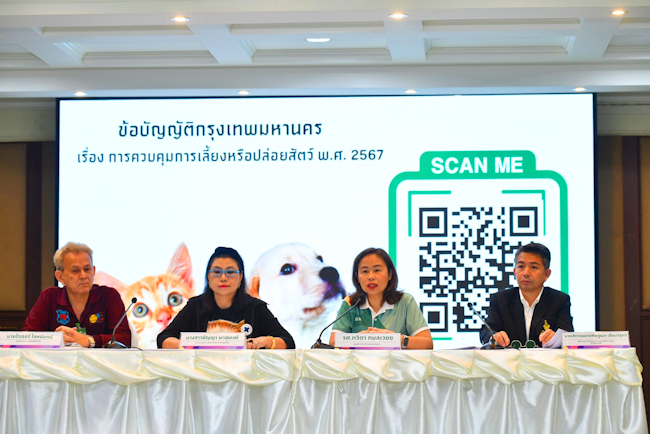Residents in Bangkok will not be forced to give up their animals despite new limits on the number of pets per household due to the upcoming Animal Control Ordinance, effective January 10, 2026, the Bangkok Metropolitan Administration (BMA) has reassured.
Bangkok Deputy Governor Tavida Kamolvej announced preparations for enforcement of the new BMA Ordinance on Animal Control (2024) during a press conference at City Hall on May 2, 2025.
The press conference included key stakeholders: Sitthaphon Iamsusut, Director of the Veterinary Public Health Department; Chanya Phasupong from the Animal Welfare Association under Royal Patronage; and Roger Lohanan, Secretary General of the Thai Animal Protection Association.
Published in the Royal Gazette on January 15, 2025, the ordinance will take effect on January 10, 2026, after a 360-day grace period. It designates Bangkok as a regulated area for keeping or releasing mammals, birds, aquatic animals, amphibians, reptiles, and dangerous or poisonous animals.
Existing Pet Owners Protected
“Many people are worried about the ordinance specifying that households or condominium units can keep 2 or 3 pets, with a maximum of 6 depending on area size. I want to clarify that this law isn’t retroactive—if you’re already keeping pets when it takes effect on January 10, 2026, you won’t be affected. There’s no need to worry or abandon your pets—continue caring for them until they naturally pass away,” Deputy Governor Tavida stated.
She explained the ordinance stems from the Bangkok Governor’s animal welfare policies, specifically:
P137: Lifetime pet registration to prevent abandonment
P138: Systematic management of stray animals to control population growth, prevent rabies, and promote rehoming to reduce new pet acquisitions.
Animal Limits Based on Property Size.
The regulations establish clear limits for keeping animals on private property in Bangkok:
Large mammals (cows, buffaloes, horses, deer): Maximum 1 animal per 200 square meters
Small mammals (goats, sheep, pigs, ponies): Maximum 3 animals per 200 square meters
Poultry (chickens, ducks, geese): Maximum 1 per 4 square meters
Large birds (e.g., ostriches): Maximum 1 per 50 square meters
Small birds: Maximum 5 per 1 square meter
Different regulations apply to businesses keeping animals in numbers exceeding these limits, with additional public health protections in place.
Public Area Exceptions
Deputy Governor Tavida explained that the ban on keeping or releasing animals in public areas of Bangkok is subject to exceptions. These include:
For the treatment or immunization of animals against disease.
For certain activities in designated public areas where the BMA has officially permitted the presence of animals for a certain period.
For relocation purposes involving the animal owner.
For government-related animal activities and for the release of animals for charitable or traditional ceremonial purposes.
Pet Owner Responsibilities.
Pet owners must:
Provide safe, species-appropriate housing with sufficient space, light, food, water, ventilation, and waste disposal.
Keep facilities clean to avoid foul odors or unsanitary conditions.
Vaccinate animals, segregate those suspected of illness, and notify relevant veterinary authorities.
Keep animals under control (dangerous species must be kept in cages with clear warnings).
Allow animals to display natural behavior.
Prevent animals from injuring or disturbing others.
Dispose of dead animals properly to avoid pollution or health risks.
Follow instructions from health departments and municipal regulations.
Dog Park in Bangkok
Dog and Cat Ownership Limits
The number of dogs and cats allowed depends on property size:
Condominiums/rental units (20-80 square meters): Maximum 1 pet.
Condominiums/rental units (over 80 square meters): Maximum 2 pets.
Land up to 20 square wah (approximately 80 square meters): Maximum 2 pets.
Land between 20-50 square wah: Maximum 3 pets.
Land between 50-100 square wah: Maximum 4 pets.
Land over 100 square wah: Maximum 6 pets.
If owners exceed these limits before the ordinance takes effect on January 10, 2026, they must notify their district office by April 9, 2026. Failure to report may result in inspection and enforcement.
In cases where animals exceed the limit for health hazard establishments such as farms, pet shops, pet cafes, pet grooming salons, or pet hotels, owners must comply with the relevant health hazard regulations.
Mandatory Pet Registration
All dog and cat owners in Bangkok are required to register their animals, obtain a pet passport, and have them microchipped within 120 days of birth or within 30 days of bringing the animal to Bangkok. This process can be completed by either the owner or an authorized representative.
The BMA emphasized that microchip identification is essential as it stores important data, not only for recovering lost pets but also for monitoring vaccinations, particularly rabies vaccinations, which are vital for public safety.
Additionally, pet ID cards will promote animal welfare by enabling access to health screenings, participation in public activities, and free vaccinations, all improving animals’ quality of life.
Registration must be submitted to relevant officials at authorized registration offices such as the Veterinary Department, Health Department, or District Offices.
Required documents include:
Owner’s national ID card
House registration document for the pet’s residence
Relevant supporting documents
Letter of consent from the landlord (if renting)
Rabies vaccination certificate (if available)
Sterilization certificate from a veterinarian (if applicable)
Power of attorney letter (if applicable).
Source: Khaosod English



